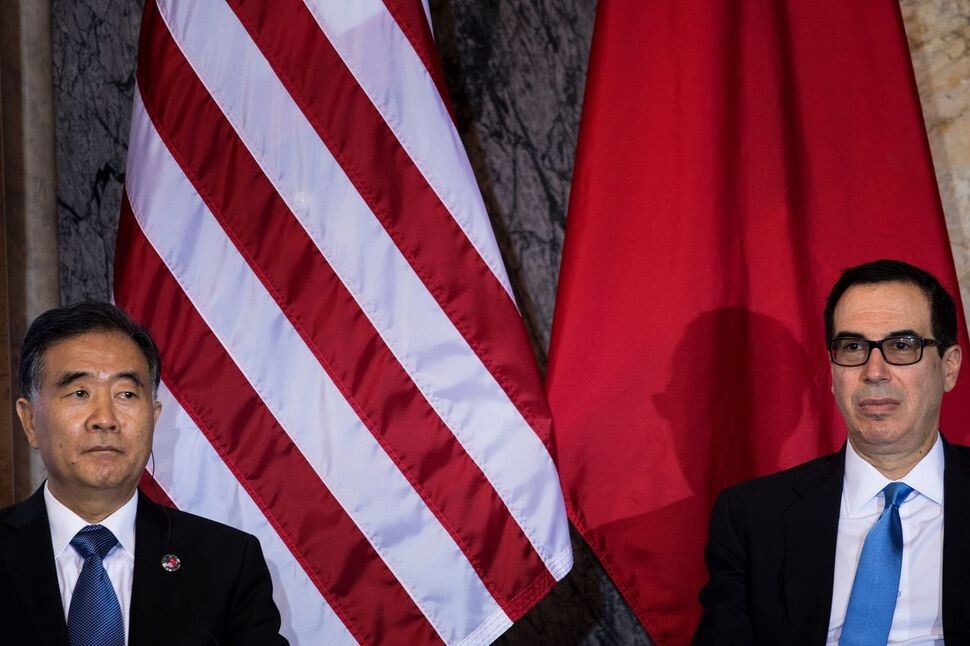hankyoreh
Links to other country sites 다른 나라 사이트 링크
US pledges to sanction ten more Chinese entities if China doesn’t cooperate on NK UNSC resolution

During the US-China Comprehensive Economic Dialogue that was held in Washington on July 19, the US reportedly communicated to China that it would impose independent sanctions on more than ten Chinese companies and individuals that do business with North Korea if China does not cooperate with a tough sanctions resolution by the UN Security Council.
“The US stated that if there is no progress in the discussion with China about a UN Security Council sanctions resolution against North Korea, it is fully prepared to implement specific independent sanctions. I’m told that this position was strongly expressed to China during the recent economic talks,” said a diplomatic source in Washington on July 20.
“But the US probably did not provide China a specific timing for the sanctions,” the source said. This means that the imposition of the sanctions will depend on whether or not China cooperates. “In addition, my understanding is that companies from several countries other than China are on the US’s sanctions list,” the source said. In connection with this, the Asahi Shimbun newspaper reported that “the US is planning to include multiple Russian companies on the sanctions list.”
The companies that the US told China would be sanctioned reportedly include Dandong Zhicheng Metallic Material Co., a company that imports North Korean coal, and companies that import coal, steel and workers, with Shandong International Trade and Xiamen Xiangyu. The US government also indicated that it could impose sanctions in a manner similar to the massive fine of about US$200 million that was slapped on the ZTE Corporation, China’s largest telecom equipment manufacturer, this past March, after the company was charged with violating sanctions against Iran and North Korea.
In related news, lawmakers in the US Congress are competing to submit sanctions bills against North Korea. On July 19, Senators Chris Van Hollen and Pat Toomey submitted the Banking Restrictions Involving North Korea (BRINK) Act of 2017 to the US Senate Committee on Banking, Housing and Urban Affairs. This bill calls for investigations into financial organizations that do business either directly or indirectly with North Korean financial organizations.
On July 13, Senator Cory Gardner, chair of the Subcommittee on East Asia and the Pacific, submitted a bill that would prevent companies that do business with North Korea from accessing the US financial network. The North Korean Enablers Accountability Act, which would cut off access to the American financial system to financial organizations that do not faithfully implement financial sanctions against North Korea, is largely aimed at Chinese banks. The bill also states in a section called the “view of Congress,” which is designed to communicate the attitude of members of Congress, that the Kaesong Industrial Complex should not be reopened until North Korea has shut down all of its nuclear, chemical, biological, and radiological weapons programs completely, verifiably and permanently. This clause would not be legally binding.
By Yi Yong-in, Washington correspondent
Please direct questions or comments to [english@hani.co.kr]

Editorial・opinion
![[Guest essay] The real reason Korea’s new right wants to dub Rhee a founding father [Guest essay] The real reason Korea’s new right wants to dub Rhee a founding father](https://flexible.img.hani.co.kr/flexible/normal/500/300/imgdb/original/2024/0423/8317138574257878.jpg) [Guest essay] The real reason Korea’s new right wants to dub Rhee a founding father
[Guest essay] The real reason Korea’s new right wants to dub Rhee a founding father![[Column] ‘Choson’: Is it time we start referring to N. Korea in its own terms? [Column] ‘Choson’: Is it time we start referring to N. Korea in its own terms?](https://flexible.img.hani.co.kr/flexible/normal/500/300/imgdb/original/2024/0423/3617138579390322.jpg) [Column] ‘Choson’: Is it time we start referring to N. Korea in its own terms?
[Column] ‘Choson’: Is it time we start referring to N. Korea in its own terms?- [Editorial] Japan’s rewriting of history with Korea has gone too far
- [Column] The president’s questionable capacity for dialogue
- [Column] Are chaebol firms just pizza pies for families to divvy up as they please?
- [Column] Has Korea, too, crossed the Rubicon on China?
- [Correspondent’s column] In Japan’s alliance with US, echoes of its past alliances with UK
- [Editorial] Does Yoon think the Korean public is wrong?
- [Editorial] As it bolsters its alliance with US, Japan must be accountable for past
- [Guest essay] Amending the Constitution is Yoon’s key to leaving office in public’s good graces
Most viewed articles
- 1[Column] ‘Choson’: Is it time we start referring to N. Korea in its own terms?
- 2[Guest essay] The real reason Korea’s new right wants to dub Rhee a founding father
- 3New AI-based translation tools make their way into everyday life in Korea
- 4Opposition calls Yoon’s chief of staff appointment a ‘slap in the face’
- 5Senior doctors cut hours, prepare to resign as government refuses to scrap medical reform plan
- 6Why Korea shouldn’t welcome Japan’s newly beefed up defense cooperation with US
- 7[Editorial] Japan’s rewriting of history with Korea has gone too far
- 8Terry Anderson, AP reporter who informed world of massacre in Gwangju, dies at 76
- 9[Column] Has Korea, too, crossed the Rubicon on China?
- 10[Column] The clock is ticking for Korea’s first lady